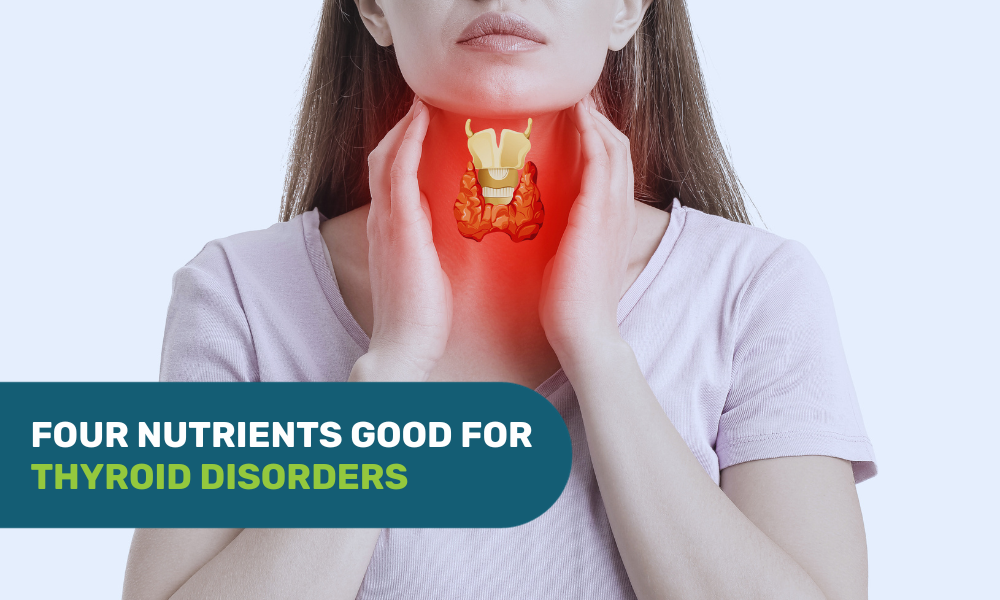Thyroid disorders involve hormonal imbalances and may impact our overall wellbeing. It is, therefore, crucial to maintain the right nutritional elements alongside medications for a healthy thyroid.
Thyroid problems affect a significant number of individuals, with women being particularly vulnerable. The thyroid gland can be either overactive (hyperthyroidism) or underactive (hypothyroidism), leading to various health issues. Therefore, one must keep a regular check on thyroid functioning especially in case of any family history.
Further, a well-balanced diet can help address thyroid concerns in the early stages. Here are four essential nutrients to incorporate into your diet to help manage thyroid issues and alleviate hormonal imbalances.
- Selenium:
It is a mineral that plays an important role in thyroid function. It is an essential component of selenoproteins, which are enzymes involved in the synthesis and metabolism of thyroid hormones. Selenium has been recognized for its potential benefits in the context of thyroid disorders, particularly in autoimmune thyroid diseases.
Selenium is integral to the conversion of thyroxine (T4) into triiodothyronine (T3), the active form of thyroid hormone. This conversion occurs through the action of selenoproteins, thereby ensuring the proper functioning of the thyroid gland. Selenium has antioxidant properties that help in protecting the thyroid gland from oxidative stress.
Sources of Selenium are Brazil nuts, fish like tuna and sardines, meat, and poultry.
- Zinc:
Zinc plays a vital role in the regulation of thyroid function. Its involvement in the synthesis, storage, and action of thyroid hormones makes it indispensable for overall thyroid health.
Zinc also aids in the conversion of T4 to T3, ensuring proper thyroid function. It is known for its immune-modulating effects, which are beneficial in autoimmune thyroid conditions. Zinc also helps in hair loss, a common symptom in thyroid disorders. By balancing hormones, zinc contributes to maintaining a healthy weight and hair.
Sources of Zinc are pumpkin seeds, beef, lamb, seafood, cheese and yogurt, chickpeas, lentils, and various nuts, such as cashews and almonds.
- Electrolytes:
Electrolytes, including sodium, potassium, and chloride, are pivotal in maintaining cellular function and ensuring proper thyroid function. In thyroid disorders, electrolyte balance becomes paramount for overall health and metabolic stability.
Electrolytes contribute to maintaining proper hydration levels, ensuring optimal thyroid function. Dehydration can impact thyroid hormone production and metabolism. Proper electrolyte balance is also essential for metabolic processes, including those influenced by thyroid hormones. An imbalance can affect metabolism, potentially leading to weight issues associated with thyroid disorders.
Sources of Electrolytes are coconut water, raw coconut, bananas, oranges, and leafy greens.
- Turmeric:
Turmeric, a golden spice commonly used in traditional medicine, has gained attention for its anti-inflammatory and antioxidant properties. Turmeric’s active compound, curcumin, may offer therapeutic benefits in the context of thyroid disorders.
Inflammation is a common factor in thyroid disorders; turmeric can help reduce this inflammatory response. Additionally, turmeric supports liver function, aiding in detoxification. A healthy liver is crucial for individuals with thyroid problems, as it contributes to hormone metabolism and regulation.
Sources of Turmeric may include fresh turmeric root, turmeric supplements, and turmeric powder.
Managing thyroid issues requires a holistic approach, and adding these key nutrients into our diet can complement medical treatments. Selenium, zinc, electrolytes, and turmeric are essential elements that support thyroid function and alleviate symptoms. However, it is crucial to consult a doctor for proper guidance. Further, a well-balanced diet and proper medical care can significantly contribute to a healthier thyroid and overall wellbeing. To get a customized thyroid-friendly diet, CLICK HERE.





